Frequently Asked Questions (FAQ)
Why contribute to a Donor-Advised Fund(DAF) rather than directly to a charity?
Donor-Advised Funds provide a number of benefits that direct donations to a charity may not, including:
- Ability to accept and process appreciated securities on which the donor does not have to pay capital gains tax.
- Variety of investment options allowing the contribution to potentially grow over time.
- Capacity to receive of securities that can benefit multiple charities.
- Creation of legacy versus providing a onetime gift.
- Separation of tax planning and charitable giving, donor receives tax deduction when a contribution is made, but grants to charity can be made later.
- Simplicity, a single contribution can benefit multiple charities while only requiring one tax substantiation letter.
Who should be listed as the Donor?
The Donor is the person(s) responsible for making the contributions to the Donor- Advised Fund (DAF). If the contributions are from joint ownership, then multiple Donors can be listed. If the Donor wants non-contributors to have grant making rights to the account, they should name those individuals as account advisors on the DAF Agreement.
What is an Account Advisor?
An account advisor is named by the donor to recommend grants from the account.
What is an Account Successor?
An account successor is the person identified by the donor to take over the account after the donor’s death. Multiple successors can be named to an account and depending on the donor’s wishes, the account can be split equally among the successors, or they can share the responsibilities. Successors can name future successors to take over the account in the event of their own death, essentially leaving a legacy from one generation to the next and so on.
What is a charitable beneficiary?
A charitable beneficiary is a charitable organization(s) identified by the donor to receive either all of the remaining assets of the account or 5% of the account annually upon the death of all the original donors. This is done as an alternative to naming an account successor(s).
Can the account be named after someone other than the donor?
Yes, donors can choose any name for the account. However, it is recommended the name reflect the donor’s name and/or the main purpose of the account such as “The Jones Family Foundation.” Notably, each grant has the ability to be recognized by either donor name, account name, anonymously or by special acknowledgment (for example, In Memory of, In Honor of).
When is a contribution considered a charitable donation?
A contribution is complete when the asset is out of the donor’s control. The time frame varies depending on the type of asset and when it’s transferred to a TFCCF Donor- Advised Fund account. The process usually will take less than two weeks.
What is the minimum to establish a Donor-Advised Fund?
A minimum contribution of $25,000 is required to establish a Donor-Advised Fund. Once the contribution(s) is made to a Donor-Advised Fund(DAF), the DAF is irrevocable. The assets of DAFs are owned and controlled by Texas Forest Country Community Foundation according to the Donor’s request in the DAF Agreement.
What types of assets can be contributed?
Contributions may be made in many forms, including cash, securities, real estate and retirement plan assets, subject to acceptance by the Texas Forest Country Community Foundation (TFCCF).
What type of asset is best to contribute?
Appreciated securities that have been held for more than one year make the most effective contributions. You can avoid the capital gains tax on the securities and can deduct their fair market value of the contribution from your federal income taxes, up to 30% of your AGI, adjusted gross income. Unused deductions may be carried forward for five(5) years.
What charities and nonprofits can grants be made to?
Donor Advisors may recommend grants to qualified charitable organizations that are tax exempt under the Internal Revenue Code Section 501(c)(3) that are not private foundations and certain governmental entities. These include charitable religious and educational organizations, as well as school districts, public libraries and other units of government. In general, TFCCF does not allow grants to non-charitable organizations from Donor-Advised Funds.
How many grants can be made in a year?
There is no limit as to the number of grants made out of a DAF account. Donor advisors may make grant recommendations by completing, signing and submitting a “Donor- Advised Fund Grant Recommendation Form” to TFCCF. Then TFCCF, in accordance with tax law, retains final discretion over disbursements from all Donor- Advised Funds. The grant recommendations from a donor advisor as to disbursements from a Donor-Advised Fund shall be solely advisory and TFCCF may accept or reject such recommendations.
If you have further questions, please contact info@tfccf.org.


